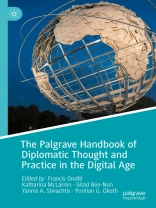This handbook integrates a range of conceptual and empirical approaches to diplomacy in the context of ongoing technological and societal change. Technological and societal disruptions affect modern diplomacy, altering its character and reforming its way. In light of such changes, this book offers both historical foundations and contemporary perspectives in the field. By doing so, it demonstrates how contemporary change impacts the work of diplomats representing sovereign states. Global diplomatic services will forever be affected by the digitalization of engagement between states during and after the COVID-19 pandemic. In this rapidly changing culture, with burgeoning geopolitical and geostrategic realignment among global powers, the tools of diplomacy have changed. The state’s foreign policy astuteness and responses to these changes could have long-term impacts. All this culminates in opportunities for improving the management of diplomaticservices and efficiency of the Ministries of Foreign Affairs (Mo FA) of various states. This book provides useful insights into how modern diplomacy works, especially the integration of informalities into formal diplomatic practices in complex peace and security environments, within such a framework of change.
İçerik tablosu
1. Introduction: Diplomatic Thought and Practice (Onditi).- Part I: Foundations of Diplomatic Thought and Practice.- 2 Visibilizing African Heritage in Diplomatic Thought and Practice (Okoth & Were).- 3 Afrodiplomacy: Collective Continental Communiqué (Kuwali & Kuwali).- 4 Feminist Foreign Policy and Diplomacy (Fröhlich & Scheyer).- 5 Modifying Diplomacy for the Twenty-First Century: A New Postmodern Approach (Georghiu).- Part II: Tools and Types of Diplomacy.- 6 The Increasing Significance of Public Diplomacy in International Relations: New Types and Actors (Maunder & Stivachtis).- 7 Sport Diplomacy (Brand).- 8 Humanitarian Diplomacy (Felfeli).- 9 Vaccine Diplomacy (Brand).- 10 Global Environmental Diplomacy (Atisa).- 11 Faith-Based Diplomacy as a New (and Old) Practice in Foreign Policy: Concepts and Cases (Lehmann Mc Larren).- 12 Dynastic Diplomacy: Soft Suzerainty, Transdynastic Relations, Nepotism (Yates).- 13 Great Power Diplomacy in the digital age (Stivachtis).- Part III: Diplomacy in a Dynamic World.- 14 African Union Non-Military Conflict Interventions (Engel).- 15 How to Apply Kinetic Diplomacy to Gray Zone Conflict (Onditi & Yuko).- 16 Africa’s Science Diplomacy (Inyang & Simelane).- 17 Neighboring Military Occupation: Modern Surrogate to Conquest (Ben-Nun).- 18 Negotiating with the Devil: Counter-Terrorism and the Rise of Mediation Organizations (Hazan).- 19 Diplomacy and Foreign Policy in the Digital Era: A Case Study of the 2015 “Refugee Crisis” in Germany (Dück).- 20 Women and Feminist Diplomacy in Turbulent Times: How France Coped with the Silent Pandemic (Anand, R.).- 21 From National to International Actorness: International Organizations and the Transformation of Public Diplomacy—The Cases of the European Union and NATO (Stivachtis).- Part IV: Experiences of Diplomacy.- 22 Foreign Service Officers: Are They Fit for Purpose? (Sooklal).- 23 Diplomats in Uniform: ‘Security Diplomacy’ Described Through a Practical Experience Report (Waldbauer-Hable).- 24 Conclusion: The English School and Diplomacy as a Dynamic and Core Primary Institution (Mc Larren).
Yazar hakkında
Francis Onditi is Associate Professor at Riara University, Kenya.Katharina Mc Larren is senior research fellow at the Max Planck Institute for Comparative Public Law and International Law, Germany.Gilad Ben-Nun is Alfred Grosser Professor at Sciences-Po, Paris, France.Yannis A. Stivachtis is Professor at Virginia Tech, USA.Pontian G. Okoth is Professor at Masinde Muliro University of Science & Technology, Kenya.












